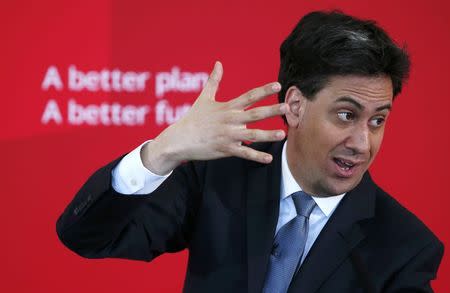Labour pledges to tackle exploitation of migrant workers
By David Milliken LONDON (Reuters) - Opposition leader Ed Miliband said on Saturday that he would set up a new government unit to prosecute employers who exploit migrant workers if his Labour Party wins power in the national election on May 7. In a major speech on immigration -- a widespread concern among Britons that has bolstered the anti-EU United Kingdom Independence Party -- Miliband set out how Labour would try to ensure immigrants did not depress British wages. "We'll make it a criminal offence to undercut pay or conditions of local workers by exploiting migrant workers," he said in a speech in northwest England. More than 600,000 people migrated to Britain in the 12 months to September, up from over half a million the year before, while average wages in Britain have failed to rise significantly despite falling unemployment. The Conservatives and Labour are neck-and-neck in one of the closest elections in decades. Both parties want to regain former supporters who have drifted to UKIP, which once attracted about a fifth of voters but has more recently seen its own appeal ebb. Labour would set up a dedicated unit in Britain's interior ministry to prosecute employers who paid migrants less than the minimum wage or broke other employment laws, Miliband said. "This exploitation of the worst kind isn't just bad for those people directly affected, it drives down living standards and conditions for everybody else," Miliband said. Miliband also reiterated Labour plans to hire an extra 1,000 border staff and ban recruiters from hiring exclusively abroad, and said that the last Labour government had erred by not imposing temporary curbs on migration from eastern Europe. Prime Minister David Cameron's Conservative Party and UKIP leader Nigel Farage both said on Saturday that none of these measures would reduce immigration. Most economists say increased immigration has boosted British economic output since the financial crisis, and see little evidence that it has reduced wages in most cases. Separately, in an interview with the Daily Telegraph, senior Conservative minister Michael Gove said his party would not do a deal with UKIP on a vote-by-vote basis, even if it failed to secure an outright majority after May 7. "I don't want to say anything disobliging ... about people in UKIP, but I've got no appetite, interest or inclination towards doing a deal with anyone," he said. Pressed on whether the Conservatives could make agreements on a vote-by-vote basis, the Telegraph reported that Gove said: "No, no, no. There won't be.... I don't think there will be many UKIP MPs -- if any -- after the election." (Reporting by David Milliken; Editing by Raissa Kasolowsky)

 Yahoo News
Yahoo News 


